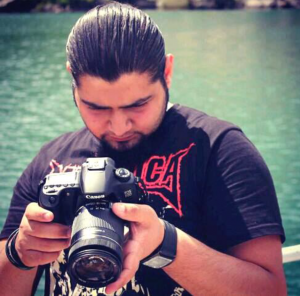Journalists Face ISIS Kidnap Threat

Just carrying a camera is dangerous in areas controlled by powerful militant group
Piroz Perik
(Ghaziantep, Turkey) — Words of prayer and longing are posted on the Facebook page of Faten Ajjan, a Syrian dissident journalist.
Her photographer son, Abboud Haddad, was kidnapped around six months ago by the Islamic State in Iraq and Syria (ISIS).

He was seized in Atmah, in Idlib province, carrying his photographic equipment on the way back to Turkey. There is no confirmed news of his whereabouts despite many attempts at mediation and communication.
Abboud’s case is not unique. News of journalists’ detentions circulate periodically, but there are few reports of their release. This makes journalists, photographers, and filmmakers uneasy.
Simply carrying a camera in areas controlled by ISIS now puts people in danger.
Majd Mohammad (a pseudonym), a photographer who lives in the Raqqa suburbs, spoke of the change after ISIS was formed.
“The situation has become completely different. Any masked man belonging to this organisation can now stop anyone carrying photographic equipment, interrogate them, and examine the contents of the camera,” he said.
“It has gotten so dire that that one journalist was flogged in public under the pretext that he was filming the headquarters of the organisation. In a short period of time, every person who was involved in any way in revolutionary, political, civil, or journalistic activity became a target,” Mohammad continued.
Ziad al-Homsi is a photographer who was detained by ISIS in Tel Abyad and then transferred to Raqqa where he was held for a further 39 days.
Homsi says that, initially, he was not targeted because he was a photographer. Most of the convoy he was travelling with from the Turkish border to Ghouta was detained. Since he had photographic equipment and a satellite internet device, he became suspect.
“They wanted to know everything about me, especially my locations and work. They harbour suspicions that journalists and photographers are spies who take photos and gather information. They accused a foreign journalist who was detained before me of being a spy,” he said.
Some photographers have been targeted more than once. Some are lucky enough to escape, such as Salah Abdallah (a pseudonym), a photographer accompanying several battalions of the Free Syrian Army (FSA) who documented military operations in Aleppo and the Latakia countryside.
His first encounter with ISIS occurred when he mistook a building where they had gathered for one where he had agreed to meet a battalion he was travelling with.
He surprised members of ISIS when he walked in with a video camera, and they promptly detained him. He was released after the battalion commander intervened, although ISIS categorically refused to return the memory card that was in the camera.
On another occasion, Abdallah and a local man were preparing a report on summer water shortages in the Jabal al-Turkman region when they were surrounded by members of ISIS. They only escaped after an FSA battalion passed by and Abdallah ran out to them to ask for help.
Others say that kidnappers target journalists, particularly foreign ones, in the hope of obtaining a ransom.
“I was with a group of Canadian journalists in the eastern region controlled by armed clans. Some clan members confronted us on our way,” said Fouad Basbous, a photographer from Saraqeb in Idlib province.
He said that the armed men intended to kidnap the journalists and set up a prisoner exchange for a relative of theirs in custody in Turkey.
“They did not leave us until they found out that I know the sheikh of their tribe. Then they toned down their language and admitted that they were going to blame ISIS,” he added.
Damascus Bureau asked Ayman Mhanna, the executive director of the Beirut-based SKeyes Centre for Media and Cultural Freedom, an arm of the Samir Kassir Foundation, about how organisations that document violations against journalists track the situation of Syrian reporters.
“There are a number of regional and international organisations that try to support journalists who cover the conflict in Syria,” he said. “Their support takes on many forms, from training to financial support to facilitating communication with embassies for those who need visas to travel to other countries.”
Mhanna believes that the situation of journalists who document abuses in Syria for international organisations is tied to the nature of their contract and their employers’ commitment to protecting them.
“Of course it goes without saying that these organisations should compensate them adequately given the risks involved and support journalists in any way they can, including facilitating their exit from Syria if need be,” he added.
Abdelrahman Jalloud is a journalist from Deir al-Zour who worked in and around Damascus. He then moved on to Raqqa, and had to leave Syria after militants from ISIS discovered the location of the radio station he worked at. The station was raided five days after he left for Turkey.
“Members of ISIS stopped me for five hours in Mansoura, right outside of Raqqa, because I had a camera. They did not release me until Liwaa al-Islam [a large rebel faction] intervened,” he said.
Jalloud and other journalists who fled to Turkey then had to face the scarcity of jobs amid price increases and difficulties in finding accommodation.
Many journalists prefer to head to the Kurdish majority regions in the north of Syria due to the ease with which they can obtain the clearances given by the Union for Free Media, part of the Supreme Kurdish Council, or to the few areas where the FSA can offer them protection.
But exiled journalists, even if they cannot find sponsorships and protection, remain luckier than their kidnapped colleagues.
Faten Ajjan is still waiting for her son Abboud. She offers prayers that he will return. The suffering of families and friends of the kidnapped and detained continues, and they all await news of their loved ones.
